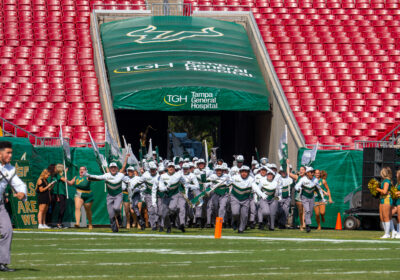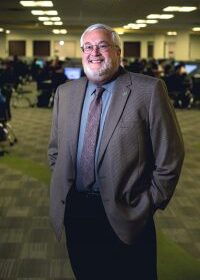USF alumnus and former rock star team up to teach
Class begins promptly at 1 p.m. There is no sitting, no note taking and absolutely no sleeping, not that one would even be able to. The most important rule is to get loud – really loud.
In the Patel Conservatory’s Rock School, students ages 10 to adult learn the intricacies of playing in a band and hone their musical skills. Rock School is led by USF alumnus Lee Ahlin and Dean Tidey, the rock-and-roll husband of a current USF instructor.
The concept of Rock School began at Paragon Music Center in Tampa in the mid-1990s, when owner Dick Rumore partnered with the Boy’s & Girl’s Clubs of Tampa Bay in an effort to spice up typical music lessons. Years later, the program is survived by the Patel Conservatory, combining traditional musical education with the freedom and rebelliousness of a garage band.
To build on Rock School’s momentum, the Patel Conservatory recruited veteran musician Tidey this year as a part-time instructor. Tidey has toured the world playing guitar with renowned artists such as Coldplay, U2 and Kim Richey, as well as with his own band, Feeder.
In April 2011, he decided to stop touring and settle down in Tampa with his family, taking the Rock School job to offer his knowledge to the next generation of rockers.
“Tidey has a rock pedigree, as well as a finger on the pulse of what rock is today,” Ahlin said. “We are extremely fortunate to have him.”
Though he is a classically trained musician, Tidey said he hopes to bring some of the rebellious spirit of rock ‘n’ roll into music education.
“At the end of the day, (Rock School) is about having fun,” he said. “So much of music is classically based. The whole fun of Rock School is you can get in a room and make a bunch of noise. I think that’s really important.”
The British rocker is somewhat of a musical purist. In a generation of YouTube, Auto-Tune and American Idol, dreams of stardom are common, but the drive is not always there.
“When I was a kid I would have to constantly rewind old records if I wanted to learn a song,” Tidey said. “Now, people can just bring up the videos.”
These hours of playing the same song over and over again once separated future musicians from bored teenagers, Tidey said. Today that obstacle is gone, producing scores of wannabe musicians seeking instant gratification with minimal work.
Ahlin, who graduated from USF in 1975 with a degree in theatre and speech, sang and played bass guitar in his own band throughout his college career. Ahlin appears to live on a unique timeline, meticulously preserved through his musical escapades.
During rehearsal he listens for the slightest errors – a missed beat, meandering note or stuttering tempo. Dressed in distressed blue jeans and a faded T-shirt, Ahlin brushes unkempt hair from his eyes as he belts out Muse’s “Knights of Cydonia” with his students. The betraying gray hue of his long hair is the only marker of his real age.
Members of the band range in skill level. Sixteen-year-old Danny Wilson began taking guitar lessons two years ago, while Matt Sichterman’s training was a bit more unorthodox. The 15-year-old’s only experience with the drums came from a video game.
“Before this I had only played the drums on ‘Rock Band,'” he said. “That helped a lot.”
Ahlin says the most difficult task is getting students out of their comfort zones. All band members must be willing to learn an instrument as well as sing – something Ahlin said can be a daunting request.
Though 16-year-old Sarah Aloia originally wanted to learn to play the drums, Ahlin encouraged her to try the bass guitar. Despite her initial hesitance, she grew to love it.
“He’s a great teacher so I picked it up pretty fast,” she said. “The bass made me feel powerful.”
Gregory Ruffer, music director for the Patel Conservatory, said programs like Rock School are
vital, especially amid national budget cuts to arts programs. Instead of rationalizing music education as a tool for students to strive academically, Ruffer says, in the end, the music is the real reward.
“Music gives people a creative outlet and shows them new ways of thinking,” he said. “It is as important as it always has been.”
Participants of Rock School spring session must audition to be placed in the best band according to their instrument, musical taste and age. They pay either monthly installments of $152 or $456 for the year, as well as provide their own instruments, with the exception of drums and keyboard. The Patel Conservatory also offers Rock School over the summer for a flat rate of $380.
Now in week eight of 12, rehearsal will culminate in a final showcase. The seven bands of Rock School will perform at a free concert at the Tampa Riverwalk on April 7.






